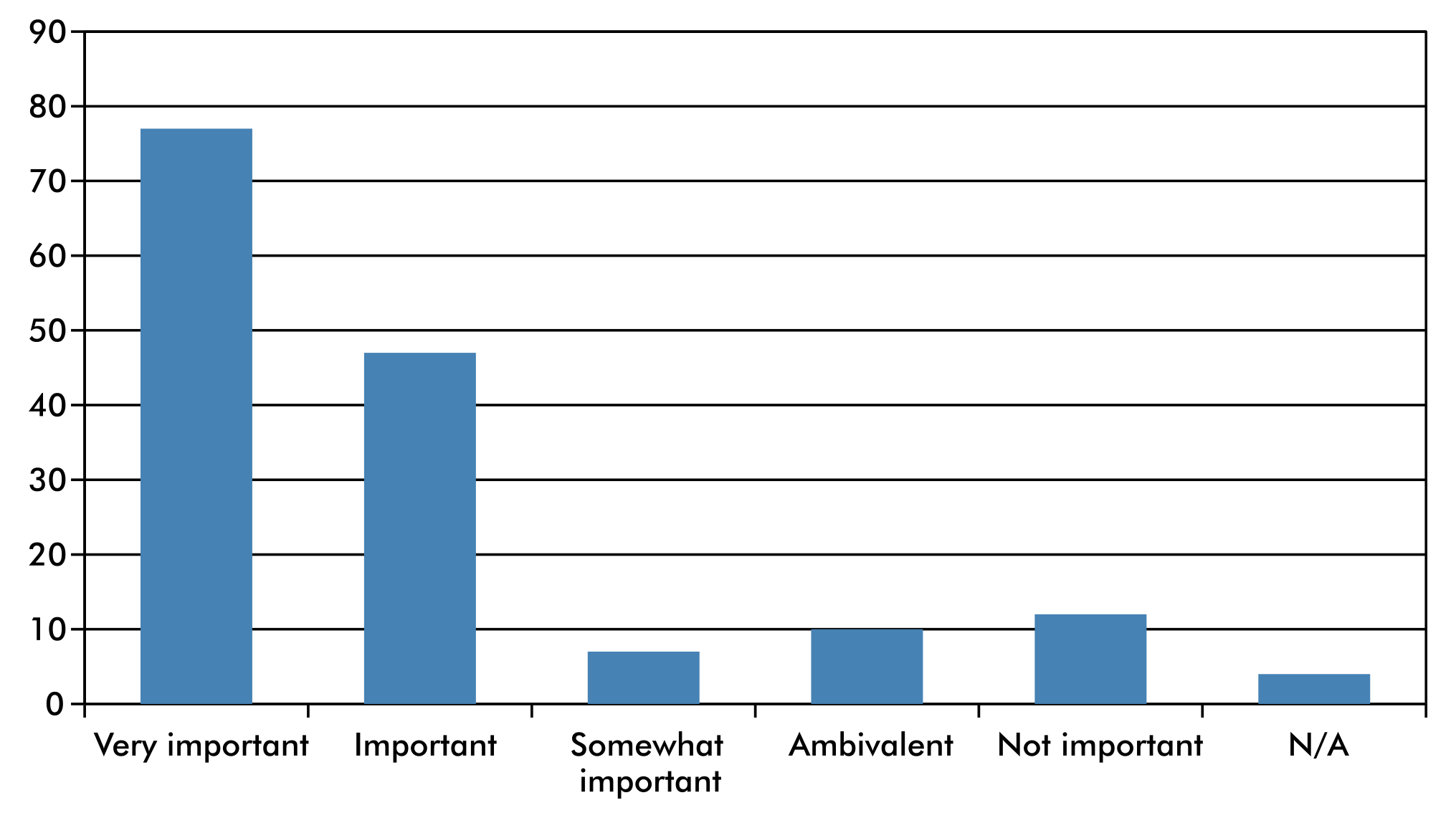Majority (87%) thought that speaking their mother tongue was very important Importance of mother tongue was related to many causes, for example to roots, identity, and personal relationships For some, mother tongue was only a tool for communication and they felt it would not matter if they stopped speaking it
Q: How important for you is speaking in your mother tongue(s)?
A: Very important. Language (Kurdish) is part of the culture and part of me as well. If I forget the language, that part of me is gone. Language is the combining piece or link between Kurdistan and Finland, my two homes. (18-29 old Kurdish speaking man)
Whereas the previous sections have heavily followed the structure of the questionnaire, this section is mostly based on answers provided to the last open-ended question about importance of mother tongue and the extra commentary in questionnaires and student reports. Feelings, sentiments, attitudes are not something best represented in graphs and tables, thus we have chosen to try represent the quotes from the consultants as plainly as possibly, though naturally they were mediated by the students.
I make long phone calls with my parents and my siblings. And my Finnish husband is starting to learn some Kikuyu, which I challenge him to do. When I’m really frustrated I might say something in Kikuyu to which my husband answers in English. I have moments when I have to speak Kikuyu and at those moments I really crave someone to speak it with. I also have a Bible in Kikuyu. I will go to any length to speak Kikuyu if possible. Maybe once a week I get to speak Kikuyu (with my parents). (30-49 year old Kikuyu speaking woman)
Like the answer from a young Kurdish speaking man who had moved to Finland as a young child, this quote from 30-49 year old Kikuyu speaking woman shows the deep connection which people can have with their languages. There was some variance in how much the consultants wanted to explain their opinions: the answers to this question varied from simple statements of ‘ very important’ to short essays.

Even though clear majority had positive view towards speaking their mother tongues there were some who thought it was not that significant. The consultants had recognised that in some cases they might change their language to another and in some cases this had partly happened already.
Not important at all, without mother I wouldn’t speak it, Greek is a “third language”, Finnish and English are in use. (30-49 year old Greek speaking man)
It’s the link to my family but not necessary in the everyday life communication (since I live far from my family). Could imagine not using English at all (which is kind of the case already) and living but using only other languages. (18-29 year old English speaking woman)
As can be seen the quotes below, people often have multiple reasons, which give value to their mother tongue. These reasons vary from importance of maintaining connection one’s home country, cultural heritage, relatives, friends to considering the language to be an inseparable part of one’s own identity.
Speaking my mother tongue is important to me because I use it all the time. This is a difficult question. Sometimes I do not want to speak it. Because of the war, Russia is an enemy who is occupying my home country and because of that the language has turned ugly. But I have to speak it because that is the only one I know. I do not want to be mistaken for Russian because I am not one. My identity is different from that of the Russians’. Because of this I would also like to improve my Ukrainian to show solidarity. (50-65 year old Russian speaking woman)
Very important. I want to retain my language and my culture and my contacts to relatives. (50-65 year old Persian speaking man)
For me it is very important to be able to speak in my mother tongue so that I can communicate with my family, friends and relatives. My mother tongue is a big part of who I am. In the future I would like my own children to be able to speak Albanian so that they feel connected to my “home country” as well. You can only be part of “Albanians” if you know the language. It is the most significant actor that unites us because history has put us all over the world by force. Albanian is a unique language that is not related to any other language, which is why it is important to “keep it alive”. (18-29 Albanian speaking woman)
Very important because of children and identity. Heritage and culture is important to me. Some things are easier to grasp in Hebrew. (30-49 year old Hebrew speaking man)
Very important. Part of my identity. I don’t want to forget my mother tongue. (18-29 year old Mandarin Chinese speaking woman)
Very important since it’s the language I use with my family and relatives. I also want to keep my Serbian roots and nationality alive. (18-29 year old Serbo-Croatian speaking woman)
It is very important to use all the mother tongues. Family and friends function in German so the language is a kind of bonding thing too. To give the language further to the children also very important. (50-65 year old German speaking man)
Is important, able to express myself, where I’m from. (30-49 year old Fanti speaking woman)
Very important. It is the language of my heart, my brain, and my soul. It is very important to me to be able to convey my thoughts and emotions with it. (50-65 year old Russian speaking woman)
I am a poet so it is absolutely core to my identity. Language is complicated and empty. I can communicate 100% in English. (50-65 year old English Speaking man)